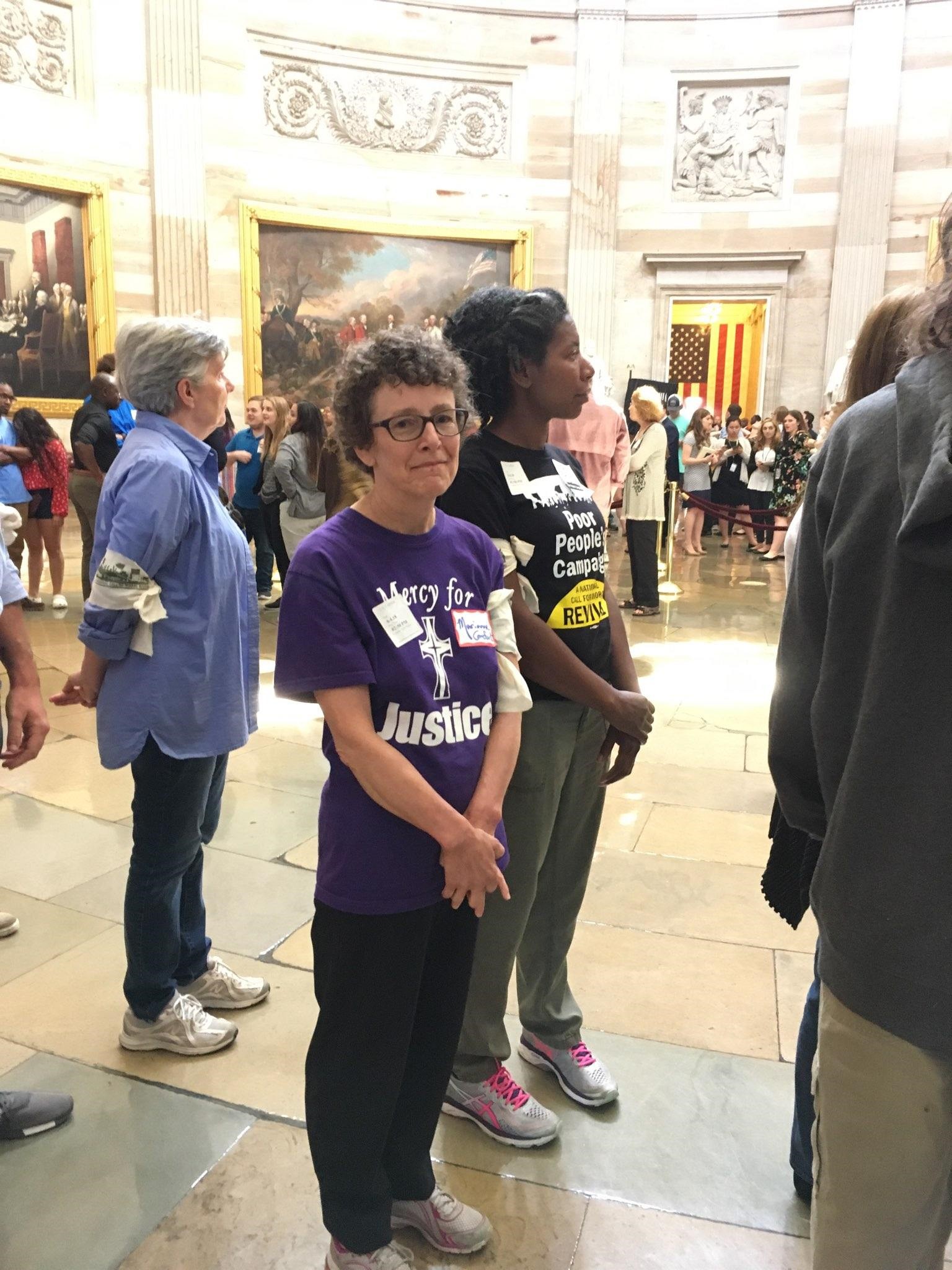My First Act of Civil Disobedience
share
topics
By Marianne Comfort, Institute Justice Team
I had never felt called to civil disobedience before.
It had felt fulfilling enough to participate in numerous rallies, engage our Mercy network in advocacy, and support Mercy sisters and coworkers in their actions protesting immigration policies, militarism and federal budget cuts to programs serving persons who are poor and vulnerable.
But joining in a short sit-in in Senator Mitch McConnell’s office last fall with survivors of hurricanes Harvey and Irma, demanding solutions to climate change, gave me a glimpse of the power of taking a risk with people most impacted by issues I care about.
So when the Poor People’s Campaign launched—putting out front those most impacted by racism and xenophobia, lack of healthcare and affordable housing, excessive military spending and other drivers of poverty—I started to think that I might be willing to take the next step.
The Poor People’s Campaign
The Poor People’s Campaign, a multi-year campaign for social justice, launched in mid-May with six weeks of actions in locations across the United States. Each Monday, hundreds of people risk arrest to raise awareness on issues including systemic racism, poverty, the war economy and ecological devastation.
I prayed and let myself sit with the possibility of joining them. I felt at peace with participating on the morning of June 4, the fourth week of the Poor People’s Campaign. This day of action focused on healthcare and a healthy planet. I would join the group at the U.S. Capitol in Washington, D.C., and other acts of civil disobedience would occur at state capitols throughout the country.
Our Civil Disobedience at the U.S. Capitol
My decision was affirmed when, before walking out to the rally that would precede our action, the 30-some people willing to risk arrest named those they would hold in their minds and hearts throughout the rest of the day. A mother had lost her son because he couldn’t get treatment for his cancer; another had a relative in Puerto Rico challenged daily to keep her insulin chilled without electricity; others named parents and grandparents struggling with deep poverty. I recalled the young hurricane survivors from Houston and south Florida I had met last fall.

We heard more stories at the rally, and then processed two-by-two to the Capitol Visitor’s Center and eventually into the Capitol Rotunda. I felt focused and part of a small activist community as we walked past statues and paintings depicting scenes from U.S. history, some of which were meant to glorify the American experience, such as the arrival of Christopher Columbus to the “new world” and the baptism of Pocahontas. Instead, these works of art pointed out centuries of injustices.
We finally took our places by the statue of Martin Luther King, Jr., and chanted and sang for justice. I barely noticed as the police cleared the space of all the tourists or as our leaders read aloud statistics of American households living without clean water, plumbing and basic medical care. In the past I had been very attentive to the police officers’ warnings to know when to step back to avoid arrest. This time, though, their shouts were just background noise as I kept focused on our messaging, feeling secure in the middle of our group.
The actual arrest was quite anti-climactic, with more than a dozen police simply collecting our IDs and ushering us out of the building. I had seen colleagues handcuffed and ushered into police vans to be taken to jail at previous actions, but we were given our citations for “crowding, obstructing or incommoding” on the Capitol lawn and told to pay a $50 fine within the next 15 days.
The Power of Protest
Some might ask, “What difference does it make?” Our chanting and singing in the Capitol Rotunda won’t change any policies or pressure members of Congress to pass helpful legislation.
But the employees at the Michigan Department of Environmental Quality certainly are more aware of the depth of concerns around access to clean and safe water after Mercy Sister Mary Ellen Howard and a couple dozen others wrapped caution tape around the building and blocked the entrances. Readers of the Washington Post understood the despair of people living in states that haven’t expanded Medicaid when they viewed a photo of a “lie-in” in the South Carolina capitol.
And I know that minds and hearts were changed among the participants of our action in Washington, D.C. Many of us were first-timers and expressed feeling more empowered to speak up for justice. I was particularly impressed with some of the young people who had traveled from Georgia to protest the poverty and lack of healthcare they and their families deal with every day. One young man said he realizes he can use his voice rather than resort to violence.
These are among the beacons of hope that collectively, the hundreds of people who have participated in civil disobedience around the country as part of the Poor People’s Campaign are creating awareness and slowly building a movement for change.